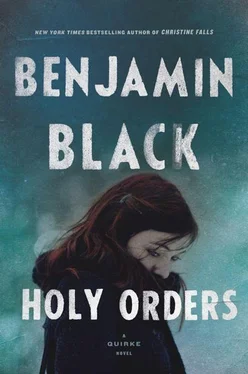Benjamin Black
Holy Orders
At first they thought it was the body of a child. Later, when they got it out of the water and saw the pubic hair and the nicotine stains on the fingers, they realized their mistake. Male, late twenties or early thirties, naked but for one sock, the left one. There were livid bruises on the upper torso and the face was so badly disfigured his mother would have been hard put to recognize him. A courting couple had spotted him, a pale glimmer down between the canal wall and the flank of a moored barge. The girl had telephoned the Guards, and the desk sergeant had dialed Inspector Hackett’s office, but Hackett was not there at that hour, and instead he got the Inspector’s assistant, young Jenkins, who was in his cubbyhole behind the cells writing up his week’s reports.
“A floater, Sarge,” the desk man said. “Mespil Road, below Leeson Street Bridge.”
Detective Sergeant Jenkins thought of telephoning his boss but then decided against it. Hackett was fond of his night’s sleep and would not take kindly to being disturbed. There were two fellows in the duty room, one, Quinlan, from the motorbike corps and the other in off his beat for a tea break. Jenkins told them he needed their help. Quinlan had been about to go off duty, and was not pleased at the prospect of staying on. “He’s on a promise from his missus,” the other one, Hendricks, said, and snickered.
Quinlan was big and slow, with slicked-back hair and eyes that bulged. He had his leather gaiters on but had taken off his tunic. He stood with his helmet in his hand and looked at Jenkins stonily out of those gooseberry eyes, and Jenkins could almost hear the cogs of the big man’s mind turning laboriously, calculating how much overtime he could screw out of the night’s work. Hendricks was not due off until four A.M. “Fuck it,” Quinlan said at last, and shrugged in vexed resignation, and took his tunic down off the hook. Hendricks laughed again.
“Is there a car in the yard?” Jenkins asked.
“There is,” Hendricks said. “I saw one there when I came in.”
Jenkins had never noticed before how flat the back of Hendricks’s skull was — his neck ran sheer all the way to the crown of his head. It was as if the whole rear part of his cranium had been sliced clean off and his hair had grown back to cover the scar. Must have a brain the size of a lemon; half a lemon.
“Right,” Jenkins said, trying to sound both brisk and bored, as his boss somehow always managed to do. “Let’s get going.”
* * *
They had a hard time of it getting the body up. The level in the lock was low, and Hendricks had to be sent to Portobello to rouse the lockkeeper out of his bed. Sergeant Jenkins set Quinlan to examining the scene with a flashlight, while he went and spoke to the couple who had spotted the body. The girl was sitting on a wrought-iron bench under a tree, white-faced in the shadows, clutching a hankie and sniffling. Every few seconds a great shiver would run through her and her shoulders would twitch. Her fellow stood back in the gloom, nervously smoking a cigarette. “Can we go now, Guard?” he said to Jenkins in a low, worried voice.
Jenkins peered at him, trying to make out his features, but the moonlight did not penetrate that far under the tree. He seemed a good deal older than the girl, middle-aged, in fact. A married man and she his bit on the side? He turned his attention back to the girl. “What time was it you found him?”
“Time?” the girl said, as if she did not recognize the word. There was a wobble in her voice.
“It’s all right, miss,” Jenkins said gently, not quite knowing what the words were supposed to mean — it was the kind of thing detectives in the movies said — and then turned businesslike again. “You phoned straightaway, did you, after you found him?” He glanced at the man in the shadows.
“She had to go down nearly to Baggot Street before she could find a phone that worked,” the man said. He had given his name but Jenkins had immediately forgotten it. Wallace? Walsh? Something like that.
“And you stayed here.”
“I thought I’d better keep an eye on the — on the body.”
Right, Jenkins thought — in case it might get up out of the water and walk away. Making sure not to be the one to make the phone call, more like, afraid of being asked who he was and what he had been doing on the canal bank at this hour of the night in the company of a girl half his age.
A car passing by slowed down, the driver craning to see what was going on, his eager face at the window ashy and round like the moon.
The girl had permed hair and wore a tartan skirt with a big ornamental safety pin in it, and flat-heeled shoes. She kept clearing her throat and squeezing the hankie convulsively. She had the man’s jacket draped over her shoulders. The man had on a Fair Isle sleeveless sweater. The night was mild, for April, but he would be cold, all the same. A display of chivalry; in that case, he must certainly be her fancy man.
“Do you live nearby?” Jenkins asked.
“I have a flat over there in Leeson Street, above the chemist’s,” the girl said, pointing.
The man said nothing, only sucked on the butt of his cigarette, the tip flaring in the dark and throwing an infernal glow upwards over his face. Small bright anxious eyes, a big nose like a potato. Forty-five if he was a day; the girl was hardly more than twenty-one. “The Guard here will take your details,” Jenkins said.
He turned and called to Quinlan, who was squatting on the canal bank looking down into the water and playing his flashlight over the floating body. He had found nothing round about, no clothes, no belongings, so whoever it was down there must have been brought here from somewhere else. Quinlan straightened and came towards them. The man stepped quickly from under the tree and put a hand on Jenkins’s arm. “Listen,” he said urgently, “I’m not supposed to be here. I mean I’ll be — I’ll be missed at home, this late.” He looked into Jenkins’s face meaningfully, attempting a man-to-man smile, but the one he managed was sickly.
“Give your name and address to the Guard,” Jenkins said stiffly. “Then you can go.”
“Is it all right if I give my office address?”
“Just so long as it’s somewhere we can contact you.”
“I’m a surveyor,” the man said, as if he expected this to be a significant factor in the night’s events. His smile kept flickering on and off like a faulty light bulb. “I’d be grateful if—”
They turned at the sound of heavy steps behind them. Hendricks was coming down the cinder bank from the road, accompanied by a heavy-set man with an enormous head and no hat. The man was wearing a striped pajama top under his jacket. It was the lockkeeper. “Jesus Christ,” he said without preamble, addressing Jenkins, “do you know what hour it is?”
Jenkins ignored the question. “We need the water level up,” he said. “You’ll have to do it slowly — there’s a body in there.”
As he moved away, the man Walsh or Wallace tried to pluck at his sleeve again to detain him but was ignored. The lockkeeper went to the edge of the canal bank and leaned forward with his hands on his knees and squinted down at the body. “Jesus,” he said, “it’s only a child.”
* * *
They positioned the squad car sideways with its front wheels on the path so the headlights would illuminate the scene. The lockkeeper had used his key and the water was falling in a gleaming rush through the opening in the sluice gates. Quinlan and Hendricks got onto the barge and found two long wooden poles and braced them against the wall of the canal to keep the barge from swaying in and crushing the body.
Читать дальше












